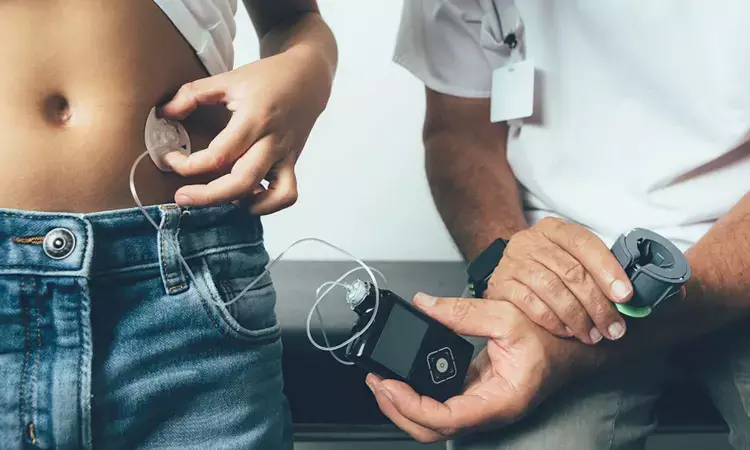- Home
- Medical news & Guidelines
- Anesthesiology
- Cardiology and CTVS
- Critical Care
- Dentistry
- Dermatology
- Diabetes and Endocrinology
- ENT
- Gastroenterology
- Medicine
- Nephrology
- Neurology
- Obstretics-Gynaecology
- Oncology
- Ophthalmology
- Orthopaedics
- Pediatrics-Neonatology
- Psychiatry
- Pulmonology
- Radiology
- Surgery
- Urology
- Laboratory Medicine
- Diet
- Nursing
- Paramedical
- Physiotherapy
- Health news
- Fact Check
- Bone Health Fact Check
- Brain Health Fact Check
- Cancer Related Fact Check
- Child Care Fact Check
- Dental and oral health fact check
- Diabetes and metabolic health fact check
- Diet and Nutrition Fact Check
- Eye and ENT Care Fact Check
- Fitness fact check
- Gut health fact check
- Heart health fact check
- Kidney health fact check
- Medical education fact check
- Men's health fact check
- Respiratory fact check
- Skin and hair care fact check
- Vaccine and Immunization fact check
- Women's health fact check
- AYUSH
- State News
- Andaman and Nicobar Islands
- Andhra Pradesh
- Arunachal Pradesh
- Assam
- Bihar
- Chandigarh
- Chattisgarh
- Dadra and Nagar Haveli
- Daman and Diu
- Delhi
- Goa
- Gujarat
- Haryana
- Himachal Pradesh
- Jammu & Kashmir
- Jharkhand
- Karnataka
- Kerala
- Ladakh
- Lakshadweep
- Madhya Pradesh
- Maharashtra
- Manipur
- Meghalaya
- Mizoram
- Nagaland
- Odisha
- Puducherry
- Punjab
- Rajasthan
- Sikkim
- Tamil Nadu
- Telangana
- Tripura
- Uttar Pradesh
- Uttrakhand
- West Bengal
- Medical Education
- Industry
Closed-loop insulin delivery systems beneficial for children with Type 1 Diabetes

UK: A recent study has found that in children with type 1 diabetes, closed-loop insulin delivery systems improve glucose control without causing adverse effects. The findings were presented on 17th June at ENDO 2023, the Endocrine Society’s annual meeting in Chicago, Ill.
“Treatment of type 1 diabetes in children is a clinical challenge,” said Amanda Godoi from Cardiff University in the United Kingdom. “We found using closed-loop systems led to improved glucose control, which represents an important treatment opportunity to reduce complications and morbidity in children with type 1 diabetes.”
A closed-loop system consists of devices that use a continuous glucose monitor and an insulin pump to regulate blood sugar levels for people with diabetes automatically. The system operates “closed-loop” because it continuously monitors and adjusts (starting and stopping) insulin delivery based on the person's blood sugar levels without requiring manual intervention.
The first closed-loop system was approved for pediatric use in the United States in 2020. Since then, many randomized clinical trials have been performed on closed-loop systems. However, according to Godoi, until now, no review of studies evaluating the effect of prolonged use of closed-loop systems on glucose levels in children and adolescents with type 1 diabetes has been performed.
The researchers reviewed nine randomised controlled trial studies lasting at least 12 weeks, comparing closed-loop systems to usual care in 892 children with type 1 diabetes. Usual care is delivery through multiple daily insulin injections or sensor-augmented pumps commonly used to treat diabetes. These are not automated and thus require the patient to monitor blood sugar levels and adjust the insulin delivery accordingly.
The children and teens using a closed-loop system had a small 0.35% reduction in HbA1c levels- a blood test that measures average blood sugar levels over the past three months. They also had an average 9.96% increase in time in an optimal glucose range without increasing the risk of adverse effects such as hypoglycemia (too-low blood sugar) and diabetic ketoacidosis (a serious complication of diabetes that develops when the body cannot produce enough insulin).
“Our results show that closed-loop technology seems to be safe and superior to usual care in controlling glucose levels,” Godoi said.
Dr Kamal Kant Kohli-MBBS, DTCD- a chest specialist with more than 30 years of practice and a flair for writing clinical articles, Dr Kamal Kant Kohli joined Medical Dialogues as a Chief Editor of Medical News. Besides writing articles, as an editor, he proofreads and verifies all the medical content published on Medical Dialogues including those coming from journals, studies,medical conferences,guidelines etc. Email: drkohli@medicaldialogues.in. Contact no. 011-43720751


